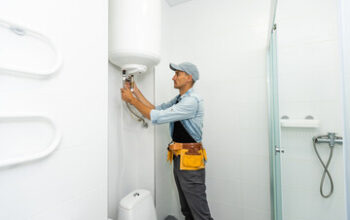A plumber installs and repairs systems that transport water, drainage, and sewage. They also inspect the plumbing to make sure it complies with building codes. Plumbing requires good problem-solving skills and the ability to work under tight deadlines. It also requires physical strength and flexibility.

Plumbers install and repair pipes and fixtures that carry water, gas, or other fluids in homes and businesses. They also work with plumbing appliances, such as toilets and sinks.
Plumber duties include responding to emergencies, performing routine maintenance, and inspecting new and existing plumbing systems for safety, functionality, and code compliance. They also handle customer queries and respond to calls from customers.
These professionals need to be physically fit, possess strong critical thinking and troubleshooting skills, and enjoy dealing with people. They can also expect to work in a variety of cramped conditions, so they must be comfortable using a variety of tools.
They may work alone or as part of a team of construction professionals. They can be expected to work long hours, especially during peak periods, but they typically set their own schedules.
Their job duties include repairing clogged drains and pipes, installing piping, replacing plumbing fittings, and diagnosing problems with the home and commercial systems. They can also perform general maintenance tasks, including drywall repair and electrical work.
Most plumbers receive training through an apprenticeship program, which usually lasts four to five years and includes 2,000 hours of on-the-job training. This type of training is available in most states and territories, and it helps you learn the basic skills you need to work independently.
You can also complete a trade school or technical college program to get the additional training you need for this career. These programs require at least a high school diploma or equivalent and can take up to two years of study.
Your duties as a plumber involve meeting with clients at their homes or business to perform plumbing repairs and preventative maintenance. You work with hand and power tools, assessing or planning plumbing installations, and following blueprints.
Plumbers often travel to different job sites each day. They typically use a company truck to visit these locations. They can be expected to work evenings, weekends, and overtime, depending on the region and industry they work in.
Plumbers perform a wide range of professional tasks, including installing, repairing, and maintaining water, sewer, and gas piping systems in residential and commercial buildings. Plumbing is an in-demand field that offers a career with strong job security and a steady income.
Many entry-level plumbers start their careers with an apprenticeship, which lasts four to five years and can be found through trade schools, businesses, and union chapters. Apprenticeships typically combine technical instruction with on-the-job training. In addition to learning plumbing skills, apprentices learn safety standards, blueprint reading, and local codes and regulations.
After completing their apprenticeship, plumbers often pursue additional education to obtain a master plumber license. This certification requires two to five years of on-the-job experience and passing an exam. In addition to licensing requirements, plumbers should also meet state and local legal regulations for safe work practices, as well as have a valid driver’s license and insurance to protect themselves from workplace injuries.
If you’re interested in becoming a plumber, consider pursuing a certificate or associate’s degree from a community college or trade school. Those who enroll in a formal program can usually complete their studies in less than two years and are eligible to sit for the licensing exam.
Several vocational institutes, colleges, and online programs offer short-term training that prepares you to enter the field in as little as three months. Some of these programs require no prior plumbing experience and can teach you the necessary skills to get a job immediately.
Some programs also provide specialized training in specific types of plumbing such as water pollution control, septic systems, and commercial plumbing. Some programs even offer a bachelor’s or master’s degree.
Aspiring plumbers should take the time to research potential employers and learn about their hiring practices. For example, some unions will pre-screen applicants. They may ask for a resume and references before selecting candidates for an apprenticeship, or they may require you to pass an aptitude test that tests your math skills.



